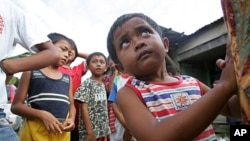Tens of thousands of undocumented immigrant children in the Malaysian state of Sabah on Borneo Island are not being allowed to go to school. Efforts to change this are under way. Early this year, a community-built education center at a refugee village was inaugurated for 300 undocumented children who previously had never attended school. With support from UNICEF and the Malaysian government, officials hope to replicate this model in other deprived communities.
Traveling to the seaside refugee village of Kampung Numbak, north of Sabah’s capital, Kota Kinabalu, is a gut-churning experience.
The tin-roofed wooden houses in this fishing community are built on stilts to prevent them from being submerged by water. Low tide waters reveal a sea of garbage. Wooden bridges, some with rotten and missing planks, connect the village streets. Small stores selling a range of items, from soft drinks and basic food to clothing and electronic wares, line the streets.
At the end of the main road is the Kampung Numbak Education Center, a simple structure built on stilts.
“In this school, there are only children that are undocumented, said U.N. Children’s Fund Representative to Malaysia Hans Olsen. "There were parents who wanted to have their children here in this school, which happened to be in the middle of the community, but they were not admitted if they had no documents.”
Stateless children
Kampung Numbak’s population of some 8,000 people is a mix of Malay nationals, refugee and undocumented migrant workers, mainly from the Philippines. Hans Olsen says Malay children can go to government-run schools, but children without birth certificates or other proof of legal residency are not given the same privilege.
“The children that are here had not been to school before," he said. "They were left behind when the other children went to the government schools. So, when you come into the classroom here in Kampung Numbak, the children you see at their desks, before the beginning of this year, they did not have access to school at all, none of them had gone to school before.”
A 2009 study by the Ministry of Education found nearly 44,000 undocumented children between the ages of seven and 17 were not enrolled in school. This figure is believed to be grossly underestimated.
Exploitation
Children who do not go to school are easily exploited. Many are forced to perform child labor. Others wind up on the streets, become involved with drugs, petty crime and are exposed to abuse.
UNICEF Monitoring and Educational Officer Nur Anuar Muthalib says education may not be a panacea. But, it can help children avoid many of these pitfalls.
“From our view, children are children," said the officer. "Their place is in school. It is not the children’s fault that they are in our country and not able to attend schooling. It is their right.”
Teachers' committment
There are more than 40 children in this classroom. The teachers are young, generally inexperienced, and poorly paid. But, they take their jobs seriously and are committed to helping their pupils learn. One teacher, Amira Binti Asen Abdullah, says she is proud of the progress her students have made in such a short time.
“Before this, the children just hang around playing," she said. "After this, because they have this school, they come here every day and study. Sometimes in the evening, they also come here. So, the students ... very, very love to come to school every day.”
Students agree. Before coming to this school, 11-year-old Normida says she could not read or count. Now, she likes going to school. She especially likes Islamic studies and wants to be a teacher when she grows up.
Thirteen-year-old Azali has never attended school. He is excited to be in class. He says he is learning a lot and wants to become a soldier.
Twelve-year-old Benhar has greater ambitions. He wants to be a money-maker. He wants to be a millionaire.
UNICEF and Malay officials say their aim is to replicate the Kampung Numbak model in other deprived communities in Sabah. Their next project, they say, will be to construct a school for an estimated 1,000 undocumented children in the refugee village of Kampung Bahagia, where the existing building is in a deplorable state.
Undocumented Children in Malaysia Barred From School




